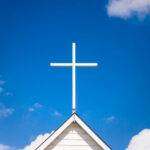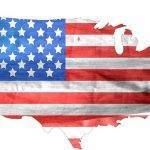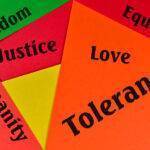I talked last week about my journey from Protestant to Catholic and back again, and as I look back on experiences that shaped my life, I count the study of culture, especially the interweaving of politics and religion as a major force. Sociology and anthropology gave me a way of thinking that made sense of my life. If I’d had any inclination to become a scholar, this is where I would have ended up, and it still, today, gives me a way of understanding what is happening.
I’ve spoken frequently of Alexis de Tocqueville’s Democracy in America, and the many insights it has given me over the years. Today, I’d like to talk about a more recent work; Habits of the Heart (1985,2007), by Robert Bellah, William Sullivan, and Richard Madsen. The title comes from de Tocqueville—an admirable expression, in my thinking—for the norms we have so often felt violated by the past administration. The subtitle, Individualism and Commitment in American Life expresses its relevance to today’s crises. I read both of these books too long ago to trust my memory very far, but the central themes have stuck with me.
Though individualism and commitment often conflict, religion, in Bellah’s view, first gives order to the universe, then shapes the civil society. For de Tocqueville, it is the force that demands that one look beyond oneself and whose tenants determine the habits of the heart. This is both its strength and its danger, for conflicting religions threaten those vital underpinnings of order and carry us into war. Thus the truth in the old adage: if you want to preserve civility, don’t talk politics or religion.
But in these days when we feel threatened by the disintegrating order, it’s time to break that norm—or at least acknowledge the relationship between religion and politics. At this point I write from my own sense, enlightened by the above, that has evolved over time. The basic institutions of our country reflect the beliefs of the Protestants who created them; their central belief denies the power of the Pope to determine absolute Truth and demand absolute obedience. That difference doesn’t resolve any conflict; indeed it has been and still is a major cause of bloodshed and death. But the distinction removed civil society from the Pope and allowed democracy to evolve.
For me, this would have remained academic if I had not become a Catholic for ten years. As a graduate student’s wife, I felt a bewildering difference between myself and another such wife when she discovered she was pregnant with her fifth child. Though worried about the effect of another child on her husband’s career, she rested in the certainty that this was her duty to God. I was equally certain the responsibility was ours, and my husband, though raised in the Church, felt the same. This is a distinction I’ve carried with me for a lifetime. I felt the same difference in power and accountability in inner-city Chicago among Blacks where the culture of slavery lingers, and I hear it in fundamentalist Christianity of all sorts today.
The difference between authoritarianism and democracy is the belief in a single Truth for all time versus a truth that evolves over time. There has been much written about the relationship between Protestantism and both democracy and capitalism, but this sense of one’s own power, freedom, right, responsibility, and accountability is profound. It’s the habit of the heart that not only gave birth to individualism but allowed the state to become separate from the church, though clearly many fundamentalist Protestants as well as Catholics wish to reclaim it for their God.
But if not accountable to God, accountable to whom? For secular America, the answer is to the law, which is decided by the majority and evolves its definition of truth over time. Robert Bellah saw the answer more fully in proposing the formation of a “civic religion,” which includes those unwritten habits of the heart. That is an idea worth considering, but it isn’t the direction in which we seem to be moving today. We seem stuck between the fundamentalist idea of an unchanging Truth residing in God—the “originalists” of the Supreme Court are an example—and the Libertarians who limit their accountability to any but the least government possible. On the other end are the far left Progressives who want the freedoms, but want to give the responsibility back to the government. In the body politic, all talk for the last fifty years has been about rights and freedom—none about responsibility or accountability. Even the basic “your rights end at the other fella’s nose,” seems to have failed under the power of the pandemic.
The pandemic itself should be, and may have been, the canary in the mineshaft, and awakened us to the need for each other. It may even bring commitment back as a necessary function of human existence. In fact, we may even discover the answer back in religion itself, for the one command within Christianity that is common to all of the great religions is “Do onto others as you would have them do unto you.” Accountable to each other. That is the central commitment beneath our laws, and freeing ourselves from it, as unrestrained capitalism threatens to do, invites chaos. To embrace this concept once again might bring us back from the precipice.





Comments are closed.